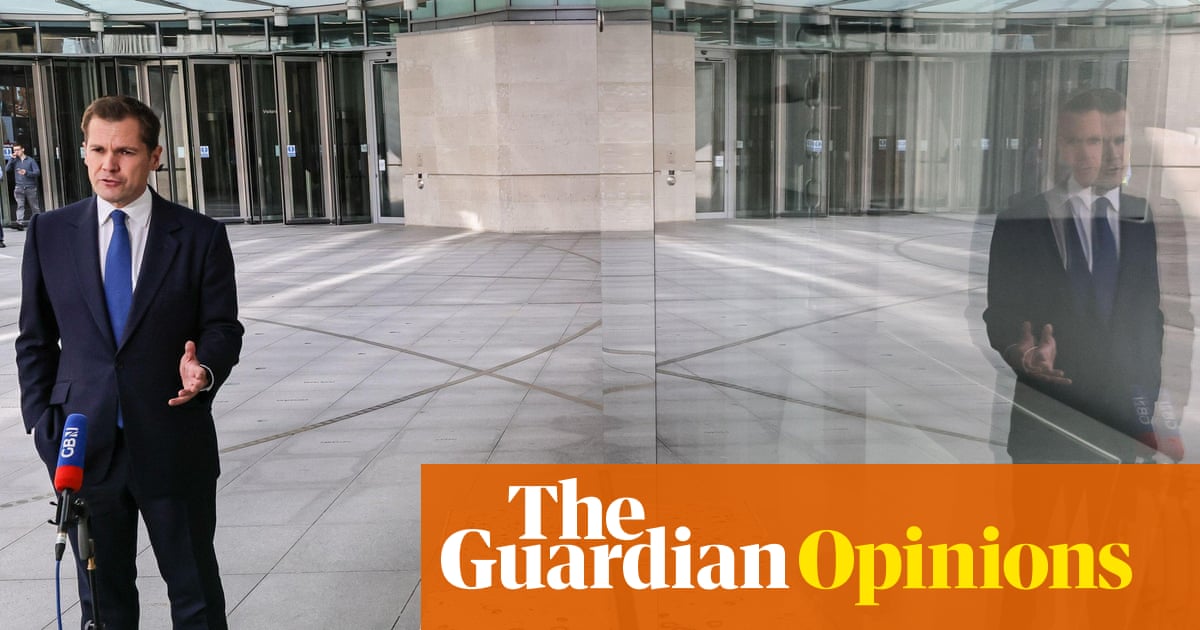The shameless opportunism of a scandal-hit political climber could have profound consequences for our democracy. The British public still knows little about Robert Jenrick, the shadow justice secretary who was seen off by Kemi Badenoch in last year’s race for the Tory crown. That will soon change, becausethe implosionof the hapless Conservative incumbent is safely filed under “when, not if” – and Jenrick will almost certainly succeed her.
Jenrick’s political evolution reflects the trajectory across the west of the so-called centre right, which has either been eclipsed by the radical right or adopted its positions. When Jenrick won the Newark byelection in 2014, he was – in the words of then nearby Tory MP Anna Soubry – a “full-fat subscriber to David Cameron”. Having defeated Nigel Farage’s then rising party, the now virtually extinct Tory wetshailed his victoryat the time as evidence that the party must resist becoming “Ukip lite”. It was a conclusion that Jenrick – who avoided campaigning on either immigration or the EU – endorsed, declaring: “You win elections at the centre.”
At the time of the referendum, Jenrick was a staunch opponent of Brexit,signing a letterthat declared that leaving the EU would “lead us into dystopia”. Even as recently as 2022, when demagogic then home secretary Suella Braverman declared that southern England faced an “invasion” of illegal migrants, Jenrick rebuked his own boss. “It’s not a phrase that I’ve used,”he saidwhen asked if she’d used the wrong term, adding: “I think in this job you do have to use your language carefully.”
Well, Jenrick has managed to drastically outbid Braverman on extreme language. Britain has imported “hundreds of thousands of people from alien cultures who possess medieval attitude towards women”,he declares. Where his former mentor Cameron once dismissed Ukip as “fruitcakes, loonies or closet racists”,Jenrick declareshe would welcome Farage into Tory ranks. The once passionate remainernow demands that Britainleave the European court of human rights. And when Britain was in the grip of racist, Islamophobic riots,Jenrick calledfor anyone shouting “Allahu Akbar” to be arrested – in other words, criminalising the most common phrase used by observant Muslims.
Is this all a ruse to get elected leader before shifting in a completely different direction – a Tory Keir Starmer, if you will? Braverman certainly wasn’t convinced last year,declaring that Jenrick hails“from the left of the party” and looked “horrified” when she floated leaving the European court. But Jenrick is hardly unique. Consider Liz Truss, a former monarchy-trashing Liberal Democrat activist who also campaigned for remain. She now denounces the “deep state”, shares platforms with far-right US strategist Steve Bannon ashe praisesTommy Robinson as a “hero”, and this weekend attended a rightwing conference in Hungary, a quasi-dictatorship, where she talked about the “free speech crisis in Britain”.
What Jenrick truly believes is a secondary consideration: you would hardly call Donald Trump a natural ideologue, and yet he operates as a faithful executor of far-right causes. Jenrick’sallies claim he was “radicalised”by his experience at the Home Office. Alarmingly, in leaked correspondence last year with an anonymousfar-right Twitter accountthat demands “mass deportations” and banning the Qur’an, Jenrick declared himself “a great admirer” of its tweets, saying: “We agree however on what needs to happen.”
Like Trump, Jenrick will undoubtedly style himself as a man of the people, despite all evidence pointing in a different direction.Among his multiple propertiesare a £2.6m central London townhouse and a stately home: in 2020 he was accused of (but never prosecuted for)breaking lockdown rulesafter driving to the latter during the pandemic. The same year, he overruled civil servants to rush through a£1bn property dealbacked by Tory donor Richard Desmond, who had lobbied him to speed up the development to save him £40m in tax. The decision was later to befound to be unlawful. But adopting rightwing populism offers cynical aspiring demagogues protection from such scrutiny, which they present as a conspiracy to silence them.
Here’s why a Jenrick leadership will be dangerous. Across the west, there is an obvious political direction: a drift towards rightwing authoritarianism. In Hungary, democracy was destroyed by Fidesz, a supposedly centre-right party and one-time member of the Liberal International, which radicalised in power. Its leader, Viktor Orbán – like Jenrick – wasa lawyer who was presented as a moderate. The Tory faction Jenrick once hailed from is largely gone, and the prevailing Conservative wisdom is that only by lurching rightwards can the Farageist threat be dispelled.
Unlike Badenoch, who seems allergic to anything resembling a cut-through message, Jenrick will ruthlessly communicate his demagoguery, asthe latest videoofhimchasing after fare dodgers underlines. And here’s the big problem. Labour under Starmer has shown it will raid the policies and rhetoric of Farageism rather than offer an alternative to a broken economic model that is the key driver of disillusionment. When Jenrick has the top job, Britain will have two high-profile rightwing agitators spraying political discourse with incendiary rhetoric. Labour will respond by echoing their bile, legitimising a rightwing lurch rather than seeing it off. If – like the US – Britain falls into an authoritarian mire, then Jenrick’s cynical political manoeuvring may well accelerate the descent.”
Owen Jones is a Guardian columnist
